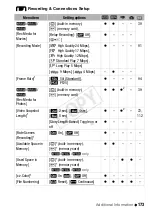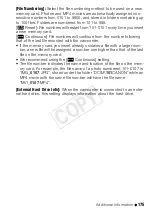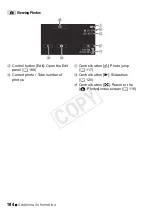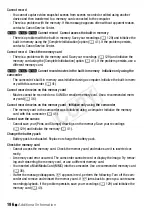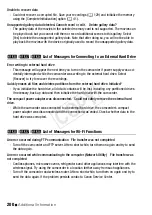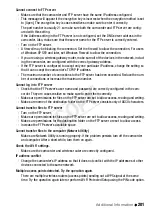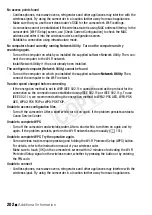
Additional Information
187
Cannot charge the battery pack.
- Make sure the camcorder is off so charging can start.
- The temperature of the battery pack is outside its operating range (approximately 0 – 40 °C).
Remove the battery pack, warm it or let it cool down, as necessary, and try charging it again.
- Charge the battery pack in temperatures between approximately 0 °C and 40 °C.
- The battery pack is faulty. Replace the battery pack.
- The camcorder cannot communicate with the battery pack attached. Battery packs not rec-
ommended by Canon for use with this camcorder cannot be charged using this camcorder.
- If you are using a battery pack recommended by Canon for use with this camcorder, there
may be a problem with the camcorder or battery pack. Consult a Canon Service Center.
A noise can be heard from the compact power adapter.
- A faint sound can be heard while the compact power adapter is connected to a power outlet.
This is not a malfunction.
The battery pack is exhausted extremely quickly even at normal temperatures.
- The battery may have reached the end of its battery life. Buy a new battery pack.
Recording
Pressing
Y
will not start recording.
- You cannot record while the camcorder is writing previous recordings onto the memory
(while the ACCESS indicator is on or flashing). Wait until the camcorder has finished.
- The memory is full or it already contains the maximum number of scenes of AVCHD movies
(3,999 scenes). Delete some recordings (
A
60, 118) or initialize the memory (
A
free some space.
The point where
Y
was pressed does not match the beginning/end of the
recording.
- There is a slight interval between pressing
Y
and the actual start/end of record-
ing. This is not a malfunction.
The camcorder will not focus.
- Autofocus does not work on the subject. Focus manually (
A
- The lens is dirty. Clean the lens with a soft lens-cleaning cloth (
A
208). Never use tissue
paper to clean the lens.
When a subject flits across in front of the lens, the image appears slightly bent.
- This is a phenomenon typical of CMOS image sensors. When a subject crosses very quickly in
front of the camcorder, the image may seem slightly warped. This is not a malfunction.
Changing the operating mode between recording (
Ü
)/record pause (
Û
)/playback (
Ð
)
takes longer than usual.
- When the memory contains a large number of scenes, some operations may take longer than
usual. Save your recordings (
A
129) and initialize the memory (
A
COP
Y

